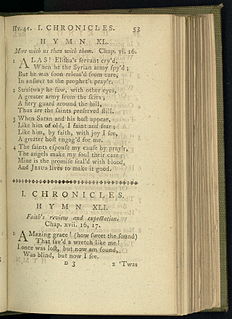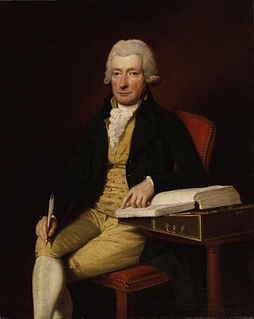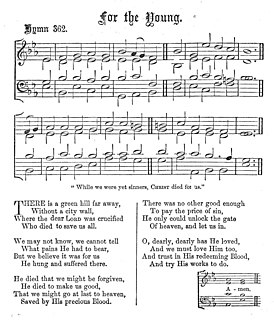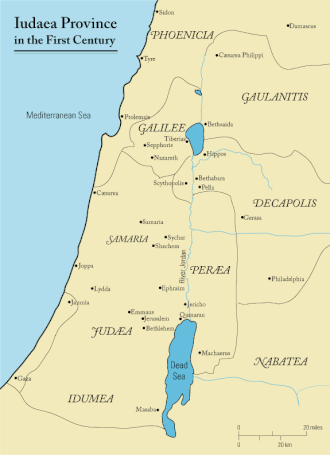
"America the Beautiful" is a patriotic American song. Its lyrics were written by Katharine Lee Bates and its music was composed by church organist and choirmaster Samuel A. Ward at Grace Episcopal Church in Newark, New Jersey. The two never met.

"Amazing Grace" is a Christian hymn published in 1779, with words written in 1772 by the English poet and Anglican clergyman John Newton (1725–1807). It is an immensely popular hymn, particularly in the United States, where it is used for both religious and secular purposes.

The Liberal Party of Australia is a major centre-right political party in Australia, one of the two major parties in Australian politics, along with the centre-left Australian Labor Party. It was founded in 1944 as the successor to the United Australia Party.

Sir Robert Gordon Menzies,, was an Australian politician who twice served as Prime Minister of Australia, in office from 1939 to 1941 and again from 1949 to 1966. He played a central role in the creation of the Liberal Party of Australia, defining its policies and its broad outreach. He is Australia's longest-serving prime minister, serving over 18 years in total.

Samaria is a historical and biblical name used for the central region of the ancient Land of Israel, bordered by Galilee to the north and Judaea to the south. For the beginning of the Common Era, Josephus set the Mediterranean Sea as its limit to the west, and the Jordan River as its limit to the east. Its territory largely corresponds to the biblical allotments of the tribe of Ephraim and the western half of Manasseh; after the death of Solomon and the splitting-up of his empire into the southern Kingdom of Judah and the northern Kingdom of Israel, this territory constituted the southern part of the Kingdom of Israel. The border between Samaria and Judea is set at the latitude of Ramallah.

"John Brown's Body" is a United States marching song about the abolitionist John Brown. The song was popular in the Union during the American Civil War. The tune arose out of the folk hymn tradition of the American camp meeting movement of the late 18th and early 19th century. According to an 1889 account, the original John Brown lyrics were a collective effort by a group of Union soldiers who were referring both to the famous John Brown and also, humorously, to a Sergeant John Brown of their own battalion. Various other authors have published additional verses or claimed credit for originating the John Brown lyrics and tune.

The Walrus is a Canadian general interest magazine which publishes long-form journalism on Canadian and international affairs, along with fiction and poetry by Canadian writers.

"Away in a Manger" is a Christmas carol first published in the late nineteenth century and used widely throughout the English-speaking world. In Britain, it is one of the most popular carols; a 1996 Gallup Poll ranked it joint second. Although it was long claimed to be the work of German religious reformer Martin Luther, the carol is now thought to be wholly American in origin. The two most-common musical settings are by William J. Kirkpatrick (1895) and James Ramsey Murray (1887).

Cecil Frances Alexander was an Anglo-Irish hymnwriter and poet. Amongst other works, she wrote "All Things Bright and Beautiful", "There Is a Green Hill Far Away" and the Christmas carol "Once in Royal David's City".

Luke 1 is the first chapter of the Gospel of Luke in the New Testament of the Christian Bible. With 80 verses, it is one of the longest chapters in the New Testament. This chapter describes the events leading up to the birth of Jesus. The unnamed author of Luke names its recipient, Theophilus, who is most likely a real person or could simply mean a fellow believer, since theophilus is Greek for God lover. Acts of the Apostles, the companion volume of Luke, is addressed to Theophilus in the same way. The title "The Gospel of Luke", found in many Bibles and some manuscripts, was added later with no indication that it was originally part of the text. The book containing this chapter is anonymous, but early Christian tradition uniformly affirm that Luke composed this Gospel as well as the Acts of the Apostles.

Hanan Tobias Simpson Menzies is an English stage, television and film actor. He is best known for playing Frank and Jonathan "Black Jack" Randall in STARZ's Outlander, for which he received a Golden Globe Award nomination, in addition to his roles as Brutus in HBO's Rome and Edmure Tully in HBO's Game of Thrones. Menzies also portrayed Prince Philip, Duke of Edinburgh in the third and fourth seasons of Netflix's series The Crown, which earned him further nominations for a Golden Globe Award and a Primetime Emmy Award.
Far Far Away may refer to:

Luke 9 is the ninth chapter of the Gospel of Luke in the New Testament of the Christian Bible. It tells the records of several great miracles performed by Jesus, the story of his transfiguration, the sending of the twelve disciples, Peter's confession and the final departure from Galilee towards Jerusalem. Scottish minister William Robertson Nicoll describes this chapter as unfolding "sundry particulars which together form the closing scenes of the Galilean ministry". The book containing this chapter is anonymous, but early Christian tradition uniformly affirmed that Luke composed this Gospel as well as the Acts of the Apostles.
Helen Macfarlane, born Barrhead, 25 September 1818, Renfrewshire, Scotland, died Nantwich, Cheshire, England 29 March 1860, was a Scottish Chartist feminist journalist and philosopher, known for her 1850 translation into English of The Communist Manifesto by Karl Marx and Friedrich Engels which was published in German in 1848. Between April 1850 and December 1850, Macfarlane wrote three essays for George Julian Harney's monthly, the Democratic Review and ten articles for his weekly paper, The Red Republican. In 1851 Macfarlane "disappeared" from the political scene. Until recent research by Macfarlane's biographer David Black and BBC Radio Scotland researcher and broadcaster Louise Yeoman, very little was known for sure about her early and later life. Yeoman writes of Macfarlane:
John Menzies Macfarlane was a Scottish-born Latter-day Saint hymnwriter, choir director and civic leader who spent most of his life in Utah Territory.
Chatterley is a surname. Notable people with the surname include:

Acts 12 is the twelfth chapter of the Acts of the Apostles in the New Testament of the Christian Bible. It records the death of the first apostle, James, son of Zebedee, followed by the miraculous escape of Peter from prison, the death of Herod Agrippa I, and the early ministry of Barnabas and Paul of Tarsus. The book containing this chapter is anonymous, but early Christian tradition uniformly affirmed that Luke composed this book as well as the Gospel of Luke.

Edward David Macfarlane is an English singer, songwriter, musician, record producer and the lead vocalist of the English electronic music band Friendly Fires. He is often called by the nickname "Ed Mac" to avoid confusion with his bandmate and guitarist Edd Gibson. He has written, co-written, produced or co-produced all of the Friendly Fires' songs.

"God Moves in a Mysterious Way" is a Christian hymn, written in 1773 by William Cowper from England. It was written by Cowper in 1773 as a poem entitled "Light Shining out of Darkness", The poem is the likely source for the phrase "God moves in mysterious ways", although the first line of the poem actually runs "God moves in a mysterious way." The poem, the last hymn text that Cowper wrote, was written following his attempted suicide while living at Olney. John Newton published the poem the next year in his Twenty-six Letters on Religious Subjects; to which are added Hymns (1774).

"There is a green hill far away" is a Christian hymn, originally written as a children's hymn but now usually sung for Passiontide. The words are by Cecil Frances Alexander, and the most popular tune by William Horsley.
















